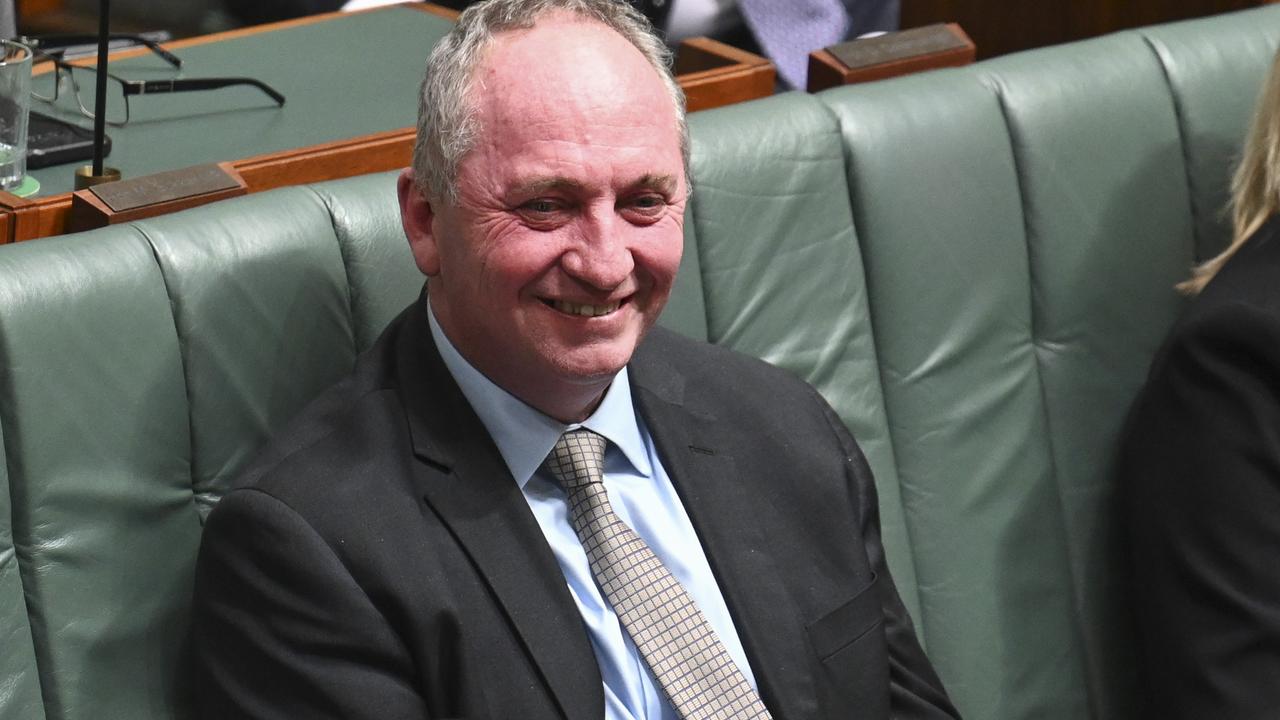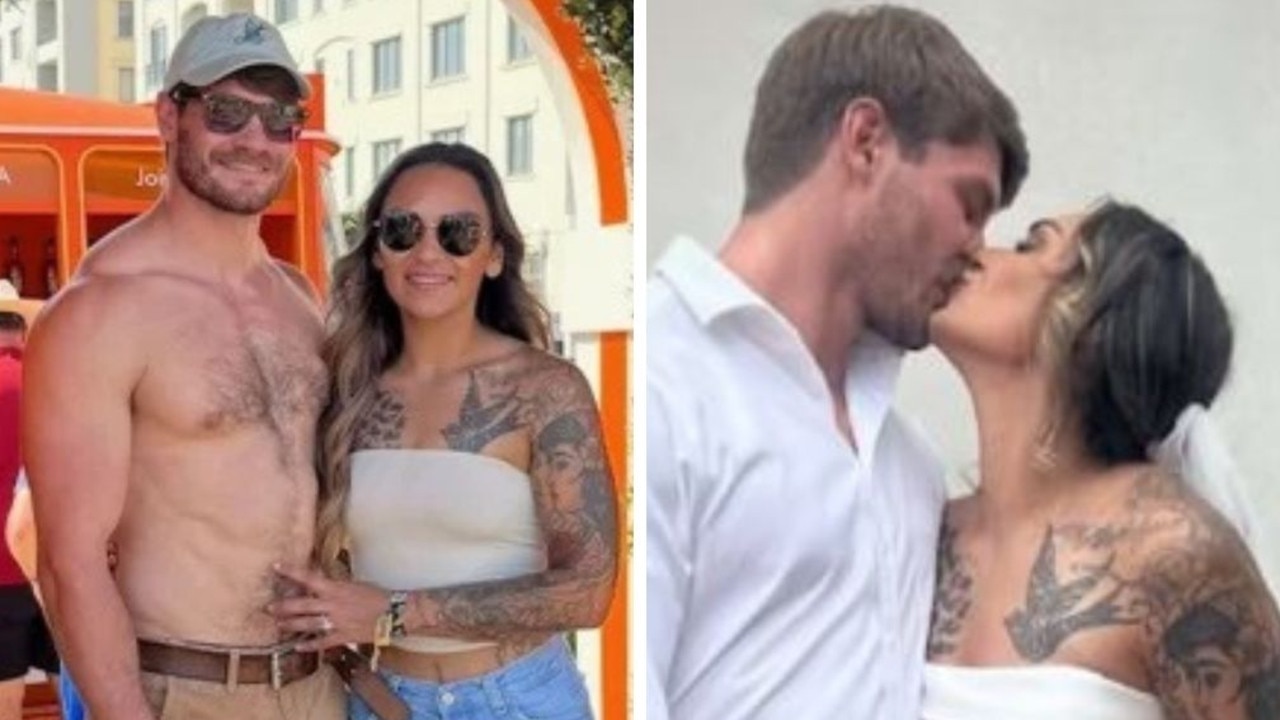What are monoclonal antibodies? Trump begins experimental virus treatment
Donald Trump’s doctor has revealed the President has had his “first dose” of an experimental drug cocktail, baffling medical experts.
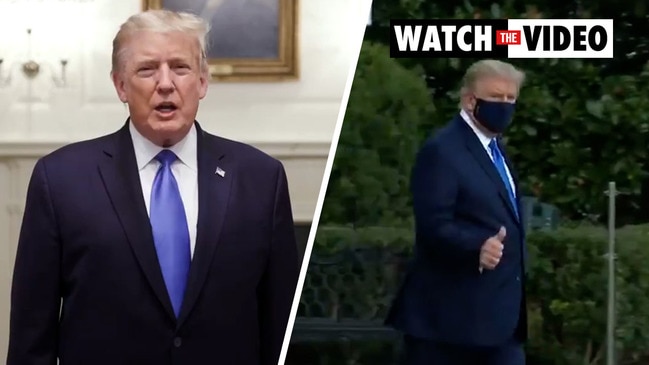
US President Donald Trump has received his “first dose” of an experimental cocktail of antibodies as part of his treatment for the coronavirus, according to his doctor.
White House physician Sean Conley issued a statement that described the medication Mr Trump has since begun taking.
“As of this afternoon the President remains fatigued but in good spirits,” Dr Conley said.
“He’s being evaluated by a team of experts, and together we’ll be making recommendations to the President and First Lady in regards to next best steps.
“As a precautionary measure, he received a single eight gram dose of Regeneron’s polyclonal antibody cocktail. He completed the infusion without incident.
“In addition to the polyclonal antibodies, the President has been taking zinc, vitamin D, famotidine, melatonin and a daily aspirin.”
A few hours later, after the president was removed from the White House and taken to Walter Reed Medical Centre, Dr Conley issued another update to say Mr Trump was “doing very well” after also undergoing his first treatment of Remdesivir therapy.
“I am happy to report that the President is doing very well,” the letter reads. “He has completed his first dose and is resting comfortably.”
Dr Conley also stated that currently Mr Trump was not “requiring any supplemental oxygen” alongside the therapy.
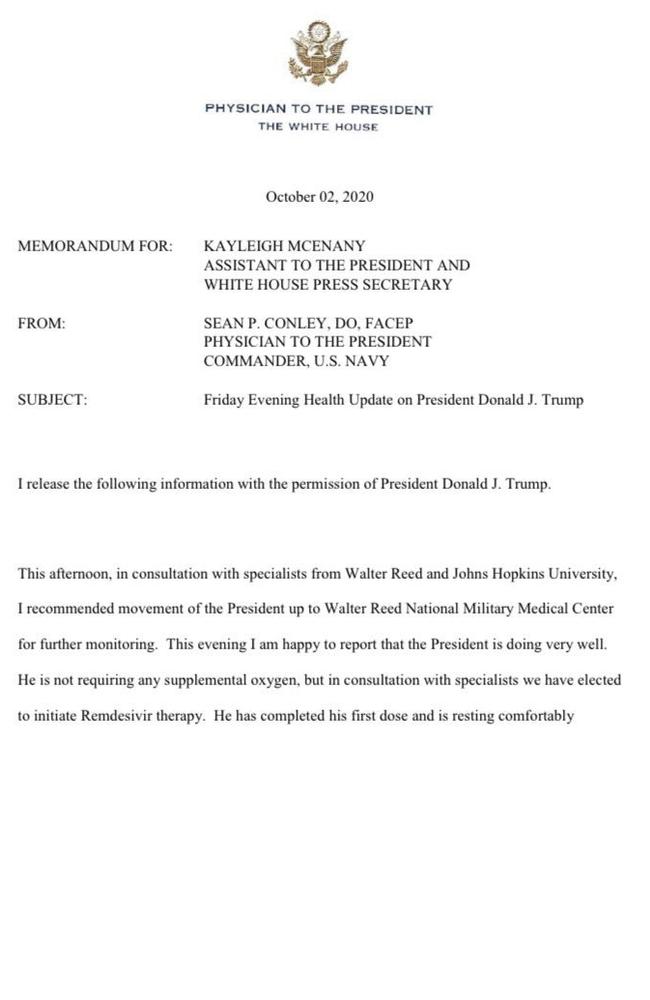
The first statement about the experimental drug cocktail came about an hour before the announcement that Mr Trump would be taken to Walter Reed.
Famotidine is typically used as a treatment for heartburn and acid reflux, and melatonin helps people sleep. But what, exactly, is the “polyclonal antibody cocktail” Dr Conley mentioned?
The drug Mr Trump took, created by the pharmaceutical company Regeneron, comes from an promising but experimental type of medicine called monoclonal antibodies.
The idea is to artificially create a powerful immune response in the body by infusing it with manufactured antibodies.
Washington Post science reporter Carolyn Johnson wrote about the treatment at length earlier this week. This is how she explained it.
“The experimental shot of lab-generated antibodies imitates the body’s own disease-fighting force. The goal is to boost a person’s immune defence, instead of waiting for human biology to muster its own response,” Johnson said.
She quoted Francis Collins, director of the National Institutes of Health, who said monoclonal antibodies are “a real chance of being a game changer” in medicine.
RELATED: Donald Trump to spend ‘days’ in hospital
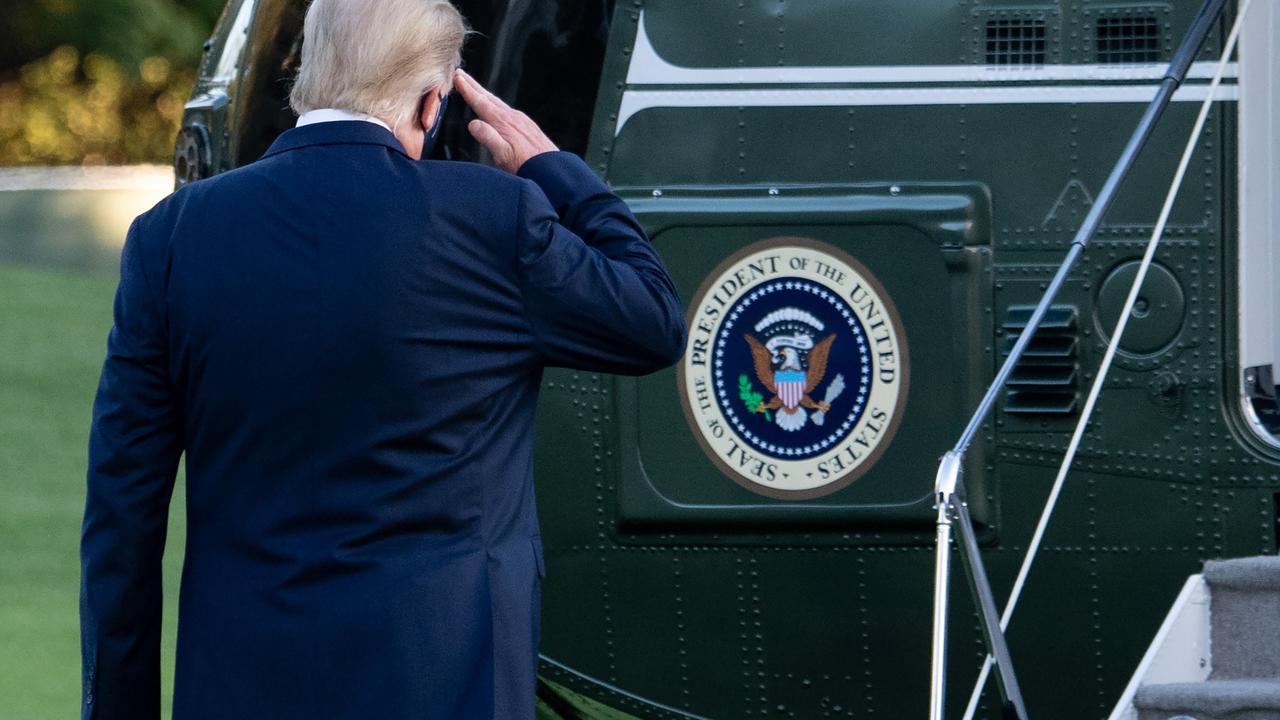
Regeneron’s drug, REGN-COV2, contains two different antibodies – one created by the company, and the other isolated from people who have recovered from the coronavirus. It’s given as a one-time treatment through an IV.
It is still in the testing phase, so if Mr Trump were not President, he would struggle to get hold of it.
Early data, albeit from just 275 patients so far, is encouraging.
On Tuesday, two days before Mr Trump tested positive for the virus, Regeneron revealed data showing its cocktail of antibodies had “reduced viral load and the time to alleviate symptoms in non-hospitalised patients” infected with the disease.
The greatest improvements were observed in patients “who had not mounted their own effective immune response prior to treatment”.
“We are extremely gratified to see that Regeneron’s antibody cocktail REGN-COV2 rapidly reduced viral load and associated symptoms in infected COVID-19 patients,” said Dr George Yancopoulos, Regeneron’s president and chief scientific officer.
The response from the scientific community has been cautious optimism.
Dr Claudia Hoyen, an infectious disease specialist at the University Hospitals Cleveland Medical Centre, told CNN the results – while early – were “promising”.
“It seems safe, and it seems to be headed in the right direction in terms of decreasing the virologic load, and looks like there’s some preliminary correlation with fewer symptoms and less hospitalisations,” Dr Hoyen said.
“But again, they still have a lot of patients to get through to know for sure.”
Professor Jennifer Gommerman, an expert in immunology at the University of Toronto, was similarly upbeat.
“It appears that they’ve got positive results and that this antibody cocktail does reduce the amount of time that the patients are sick. Especially the patients that weren’t able to mount their own antibody response,” said Prof Gommerman.
“They’re obviously going to have to do much more human experiments and bigger trials to really make sure.”
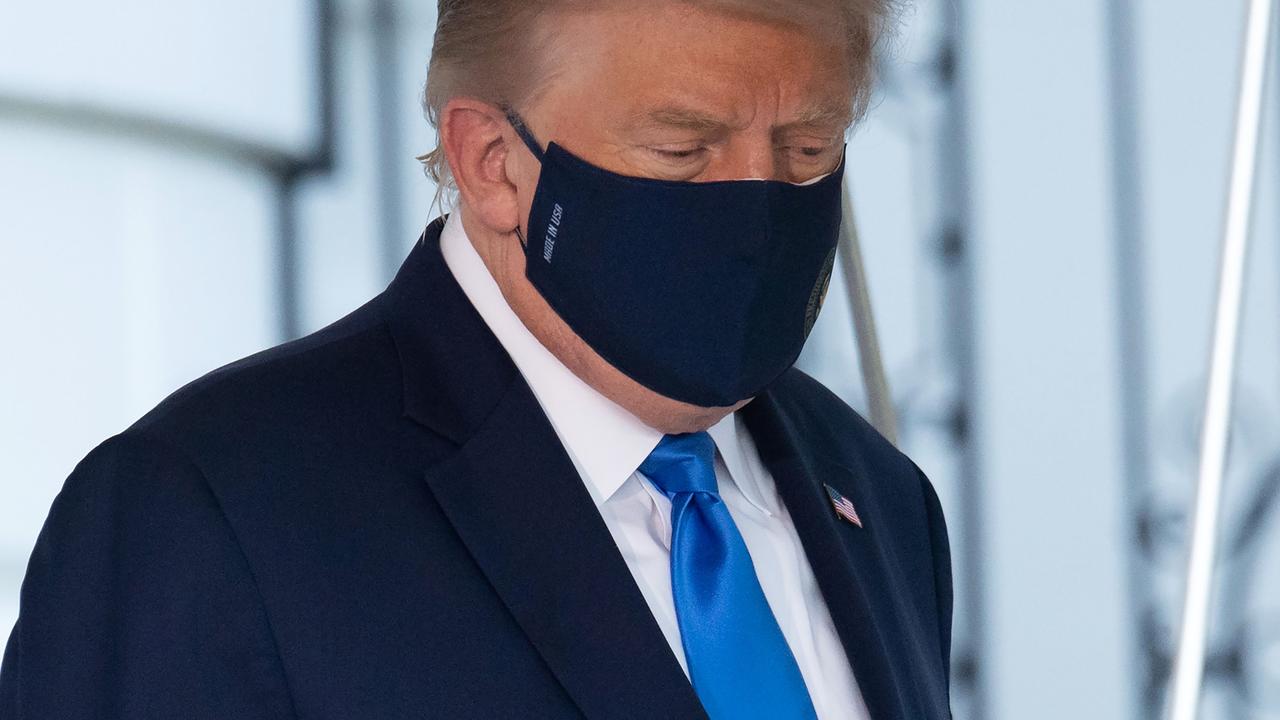
Despite REGN-COV2’s good initial results, some experts have expressed surprise and even alarm that Mr Trump has been given it.
Dr Eric Feigl-Ding, an epidemiologist and senior fellow at the Federation of American Scientists, said the revelation “worried” him.
“You almost never ever give someone a clinically untested drug like Regeneron’s polyclonal antibody drug – unless it’s for compassionate use for someone severely ill, or you’re crazy,” Dr Feigl-Ding said.
“This smacks of utter craziness or desperation.”
Dr Vincent Rajkumar, editor-in-chief of the Blood Cancer Journal, was also baffled.
“I see no rationale, unless enrolled in a formal clinical trial. Or as you describe, compassionate use in severe illness,” he said, replying to Dr Feigl-Ding.
“Not sure what’s going on. Just my general impression. Maybe (Trump is) enrolled in the trial?”
Regeneron has in fact made it clear that Mr Trump is not enrolled in any trial, and received the drug on compassionate grounds.
“All we can say is that they asked to be able to use it, and we were happy to oblige,” Regeneron’s CEO, Dr Leonard Schleifer, told The New York Times.
“When it’s the President of the United States, of course that obviously gets our attention.”
Speaking to NBC, Dr Nahid Bhadelia, who is director of the Special Pathogens Unit at Boston Medical Centre, gave perhaps the most even-handed view on the matter.
“It’s a double-edged sword, right? Because if you ask for a lot of stuff and you’re given it, particularly drugs that potentially don’t have all the backing yet, it may actually end up hurting you,” Dr Bhadelia said.
“That’s where we depend on the expertise of the physicians and the scientists around him, to be able to make that educated guess.
“Monoclonal antibodies have been deployed in other viral diseases recently. They proved to be pretty successful in ebola, they were one of the ones that reduced mortality the most.
“There really just isn’t enough data. And so, if an experimental drug – on any patient, a president or not – is being used, it needs to be done with extreme vigilance, and a lot of close attention to ensure that there are no adverse effects.
“I’m guessing that is what’s going to happen in this situation.”
Read related topics:Donald Trump


